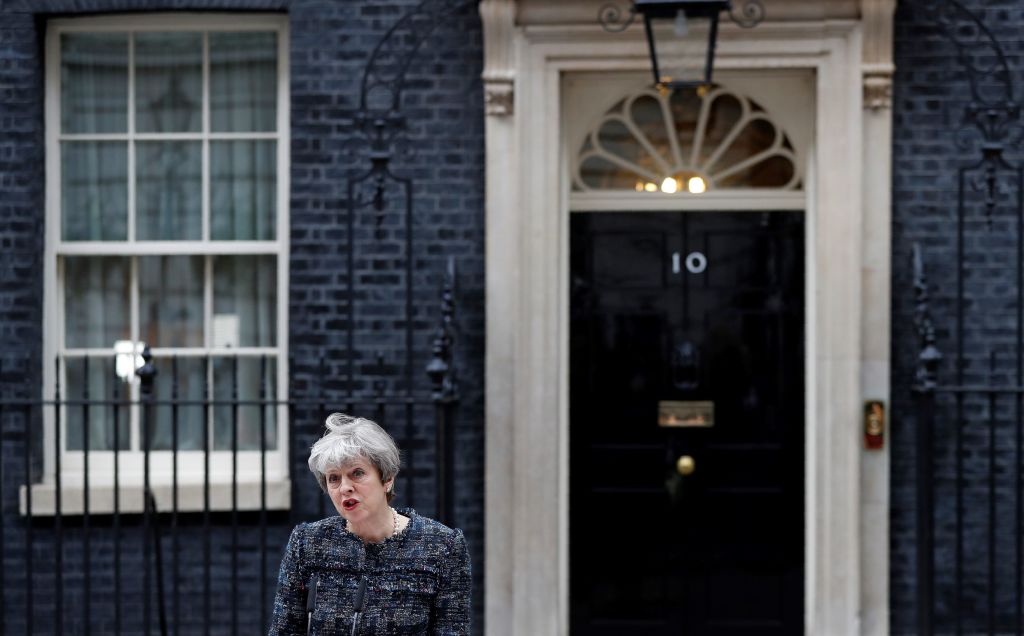Theresa May’s missive to Brussels delivered on the steps of Downing Street had a simple message: keep out of our election. The PM’s speech was her most direct attack yet against the EU and showed that she was intent on living up to her moniker of being a ‘bloody difficult woman’. Her words might have gone down badly across the Channel, but they’ve been warmly welcomed in today’s newspapers:
‘The gloves are off,’ says the Daily Telegraph, which argues that recent events have shown to the Prime Minister that ‘the prospects of a smooth Brexit have gone’. The PM’s charged statement ‘marked a break from the recent British position’, the Telegraph argues, pointing out that May ‘has clearly sensed a change in the country’s mood’ in light of the disastrous Downing Street dinner – the details of which ended up splashed all over the European press. The EU’s ‘underhand’ approach – and its repeated inflation of Britain’s Brexit bill – paints a clear picture of ‘democracy, EU-style’, the Telegraph says. The next few years will be crucial, the paper concludes. And if our ‘allies in the EU are determined to make us suffer then we need to look after our own interests as an independent nation.’.
Theresa May ‘spoke for millions’ when she rebuked Brussels bureaucrats yesterday, according to the Sun, which ‘heartily applauds her for fighting our corner.’ Whatever some might say, ‘Brussels more than had it coming,’ and it was about time that Britain ‘pushed back’. May has spent the last few months talking up the ‘deep, special’ partnership between Britain and the EU – but to no avail, the Sun says. Instead, the ‘odious’ Jean-Claude Juncker seemed happy ‘to abuse and belittle our PM over a private Downing Street dinner’. ‘Being friendly plainly cuts no ice,’ says the Sun. Brussels may have got away with having ‘smacked members around for decades’. ‘It’s not going to happen with Britain,’ says the Sun.
‘It’s war,’ says the Times, which argues in its editorial that May’s missive had two audiences: ‘Mr Barnier and his team, and the British electorate’. May will have learnt from Margaret Thatcher that in bashing the EU ‘she has much to gain with voters and little to lose’. The PM is certainly right to interpret recent events as a hardening of hearts against Britain on the continent. The Times argues that the ‘hostile briefing to the Frankfurter Allgemeine Sonntagszeitung’ about the Downing Street meeting made this plain to see. But ‘words cannot be unsaid’, the Times points out, and when Brexit talks do kick off after the snap election, ‘they will do so in an atmosphere that neither side should poison’. Whatever some may say about Britain being better off walking away, the paper says that ‘Britain needs a trade deal with Europe, and Europe needs Britain to honour its financial commitments to the EU to help fill the fiscal hole that Brexit will leave’. Therein ‘lie the seeds of an agreement’, the Times concludes.
The Prime Minister’s ‘battle cry’ ‘put into words a truth that has been plain to this paper for a fortnight, says the Daily Mail, as she ‘rightly accused European politicians’ of trying to meddle in the election. With May on her way to a ‘thumping’ victory, ‘you can almost smell the panic gripping European elites,’ says the Mail, which argues that the tactics of those trying to disrupt Brexit are becoming more and more desperate. Even yesterday, ‘the Commission’s chief negotiator Michel Barnier’ was at it again as he talked up the amount Britain would have to cough up to leave the EU. ‘Will this dismal, defeatist talk never cease?’ asks the Mail, which ends its editorial on a note of optimism. ‘When the blustering and posturing end, and the talks begin, there is every hope that EU politicians will consider the interests of their own voters and work for a deal that suits everyone’.
The PM’s message will ‘play well with Mrs May’s cheerleaders’, says the Guardian. But if she is finding negotiating Brexit tough, the fault isn’t with those across the Channel. Instead, the problem is ’with her approach, not with those who question it’, argues the paper, which accuses the PM of going after a ’deeply questionable version of Brexit’. The Guardian gazes ahead to after the snap election and voices its concerns about just how accountable Theresa May will be if she does indeed triumph convincingly on June 8. ‘Whether parliament will be able to cope with the task is highly questionable,’ the Guardian argues.







Comments